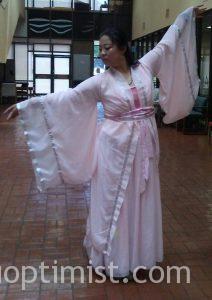A festival celebrating the moon, community and traditions of China took place Monday in the Hunter Welcome Center.
In order to maintain the traditional atmosphere of the festivities, the Chinese Students and Scholars Association (CSSA) officers were clothed in authentic Chinese garments. Attendees received moon cakes, which are the traditional food eaten during the festival.

Annie Yao, junior marketing major from China, elegantly displays traditional Chinese dancing
Annie Yao, junior marketing major from China and vice president of CSSA, performed a traditional Chinese dance, and Rui Bi, a sophomore financial management student from China and president of CSSA, performed Kung Fu moves.
Yao said that the leaders of CSSA want to communicate to students the real meaning of the Chinese tradition is, not the “American” view.
“People think China is Little Panda or Panda Express, but that is not real China,” Yao said.
One of the most important elements of the festival, according to the club leaders, is not just to keep with the traditions, but provide everyone with the feeling of hospitality and home.
Yao said that the moon festival is really special for the people who are separated from their family and missing each other. Yao also said that the moon is special because “if you are in another country or another place the moon is the same.”

Rui Bi, a sophomore financial management student from China, exhibits a pose from the ancient art of Kung Fu.
“A big thing I would do at home [in China] was eat dinner with my family,” said Bi. “And then after we would just talk and ask how it was going or how the day and school was going and then watch the moon.”
The tradition of this festival originated in ancient China, but the stories and customs vary. Katelyn Teague, CSSA secretary and junior English education major from Abilene, read one of the more well-known legends about the moon goddess Chang’e at the festival.
According to a YouTube video titled “The Legend of the Mooncake Festival,” one telling of the tale says that as a way to reward a skilled archer named Hou Yi for his heroic achievements, the Queen of Heaven gave him an elixir that would bring him immortality. Hou Yi did not want to drink it because he wished not to be parted from his beloved and virtuous wife, Chang’e.
A conniving man named Peng Meng attempted to steal the elixir of life. As a sacrifice, Chang’e drank it and flew towards the sky, where she remains immortalized on the moon. As a way to commemorate her goodness, Hou Yi built an altar for her and placed the food she liked there. The folk people followed suit and began praying to this new goddess for happiness and safety after building their own altars.
Autumn was chosen as the season for worship because they believed that was when the moon was at its brightest and fullest.
The theme of family and togetherness is still central to this tradition in modern day celebrations whereas the custom of sacrificing to the moon has become more for fun. The festival is celebrated every year on the 15th day of the eighth month of the Chinese lunar calendar. Scheduling conflicts are what forced the leaders of CSSA to choose Monday as the day of celebration.
